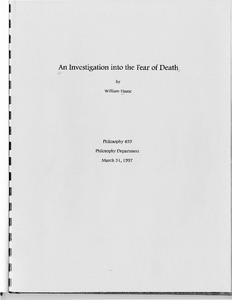| dc.description.abstract | Our thesis shall be to investigate the fear of death and the belief that death is an evil. By clarifying our notions about death as a harm to the individual I hope to show how many of our fears about death may be unwarranted and even irrational. . . . Our investigation will begin with a short analysis of fear. For the purposes of this investigation, we will not entertain ideas about an afterlife. We will do this to limit the scope of our topic and focus our thoughts. . . . We would say that for someone moving on to heaven, death was certainly good, and for someone heading for hell, death was definitely bad. But this dodges what is for me the most interesting aspects of death: its mystery and finality. Death, when seen as the end, takes on a whole new aura. So, for our investigation, we will assume that death marks the permanent and irreversible end of consciousness. Death is the transition from being to non-being, while dying, in contrast, is a state of life which should not be confused with death. Dying can be a painful and tragic experience, death is not experience, but represents the end of all our experiences. Our analysis of fear shall look at five different fears produced from meditations upon death as the permanent end of our conscious experience of life. In the next section, we shall defend the Epicurean claim that death is nothing to us. This does not mean that death is nothing for everyone, but specifically for the individual who dies. Of course the death of a friend or loved one is a great tragedy, but what we shall look at is the death of the actual individual. The claim is that death is nothing for the person who dies because at death that individual ceases to be a subject that can suffer any kind of harm at all. In response to this position we shall hear several modern philosophers criticize this view of death. Lead by Thomas Nagel's deprivation theory, these philosophers will try to show how death actually is a harm or loss for the individual. They employ a variety of theories to show how something can be bad for an individual even if that person does not experience this harm. Against these attacks I will defend the Epicurean position and try to expose the confusion of perspective inherent in these positions. This examination wiil focus on the evil of death, and how this notion leads to our fears about death. We will defend the claim that death is nothing to us, thereby demonstrating how and why the fear of death is irrational. I hope that in seeing death as nothing to us some of our fears might actually dissolve. If death is truly nothing to us, then all our fears and wonies about death only serve to diminish our experience of life while we are still alive. In the conclusion, we shall reflect back upon the progression of our analysis, and end with some final comments on the importance of humor in dealing with death. [From Introduction] | en_US |
| dc.rights | This material is made available for use in research, teaching, and private study, pursuant to U.S. Copyright law. The user assumes full responsibility for any use of the materials, including but not limited to, infringement of copyright and publication rights of reproduced materials. Any materials used should be fully credited with the source. | en_US |
